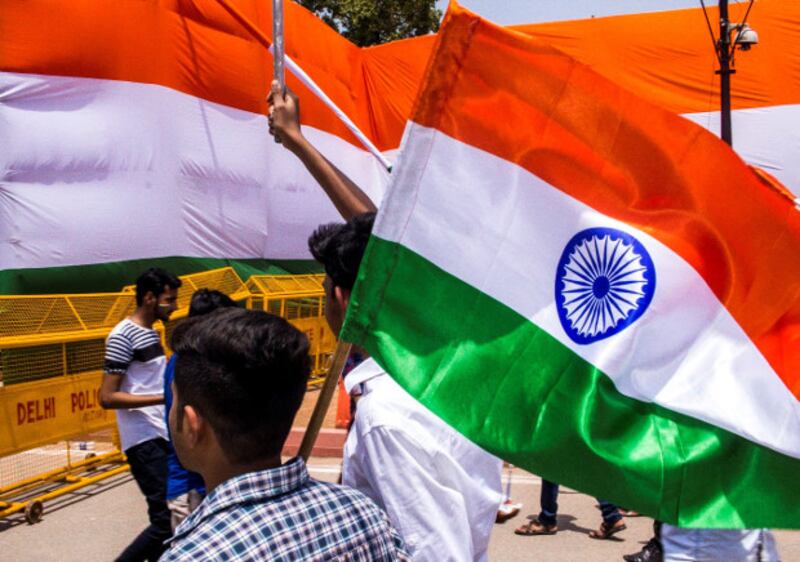As millions of Indians unfurled the national tricolor on Tuesday to celebrate their country’s 70th Independence Day, Kashmir resident Mohammad Shafi Dar hoisted a black flag above his house.
His was an act of defiance carried out in the memory of a son allegedly cut down by police fire on Sunday in the Himalayan region’s militancy-ravaged Pulwama district.
“It is in protest,” Dar, 55, said.
His 22-year-old son, Owais Ahmad Dar, was hit by a stray bullet when security forces opened fire to disperse anti-India protesters who routinely pour out on the streets of Kashmir to vent anger over killings of suspected militants.
“Owais was not among the protesters. He had his whole life in front of him. But he is dead now … only because he stepped out of the house at the wrong time. What independence are we talking about?” Dar told BenarNews.
“Indian forces are on a killing spree in Kashmir and you expect Kashmiris to celebrate India’s Independence Day. I will celebrate the day Kashmir gets freedom from Indian rule,” he said.
Dar is just one of many residents of Muslim-majority Indian Kashmir who look at India’s Independence Day with contempt.
“It only means 70 years of forced occupation and autocratic rule,” Nisar Ahmad, 24, a jobless graduate from Baramulla district, told BenarNews, while talking about India’s independence from British rule on Aug. 15, 1947.
Kashmir, claimed in its entirety by India and Pakistan, has grappled with a separatist insurgency that has claimed more than 70,000 lives – mostly civilians – since the late 1980s. India and Pakistan have fought two full-blown wars over ownership of the region since the partitioning of the subcontinent that followed independence in August 1947.
“It is a shame on the Indian leadership that Kashmir has been turned into a military zone and innocent people are held hostage in their homes day in and day out,” Ahmad said, adding that Kashmiris had marked India’s Independence Day as a black day for years.
At least 22 civilians have been killed by police gunfire in Indian-administered Kashmir since February, according to government figures.
“Police are forced to take extreme measures when the situation goes out of control,” S.P. Vaid, the chief of police in Indian Kashmir told BenarNews in late March, following violent street protests during which more than a dozen anti-India demonstrators and a security officer were injured.
Calls for dialogue
Security analysts called on the Indian government to initiate a dialogue with all stakeholders.
“The government should ignore separatists claiming to the real representatives of Kashmir and hold a dialogue with those who are elected representatives in order to find a solution to the Kashmir problem,” Ajai Sahni of the New Delhi-based Institute of Conflict Management told BenarNews.
Many Kashmiris want to celebrate India’s Independence Day but do not because of threats from militants in the region, Sahni said.
Noor Baba, a Srinagar-based political analyst, agreed.
“New Delhi should not wait for the last militant to be killed before initiating a dialogue with genuine stakeholders,” Baba told Benar.

People wave the national flag as they celebrate India's 70th Independence Day in the capital New Delhi, Aug. 15, 2017. [Shashank Shekhar/Benar News]
Although there is no question of going soft on militancy, the Kashmir issue can be resolved only by embracing Kashmiris, said Veena Sikri, former Indian High Commissioner to Bangladesh and Malaysia.
“You need to have a combination of political, military and economic thought processes to resolve the Kashmir issue,” Sikri told BenarNews.
Another analyst blamed Pakistan for instigating the Kashmiri youth against India.
“The security establishment of Pakistan views Kashmir as an issue that validated their very existence as a nation-state. “Pakistan has used this calculation as a strategy, and quite successfully,” foreign policy expert Vinay Kaura told BenarNews.
India routinely accuses Pakistan of backing and funding separatism in Kashmir. Pakistan has repeatedly denied this charge, saying the decades-old violence in Kashmir is a result of India’s oppressive rule in the Muslim-majority region.
India and Pakistan need to accept the ground reality and find a solution to convert the Line of Control – the de facto border that divides Kashmir between the two sides – into an international border, Kaura said.
“A real global policy on Kashmir has yet to be formulated. The violence must be controlled so discussions can be held. The road ahead lies in negotiations and discussions,” he said.
Akash Vashishtha and Rohit Wadhwaney in New Delhi contributed to this report.
